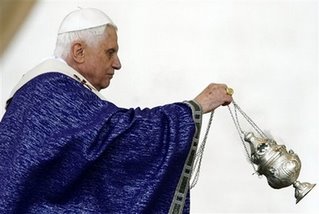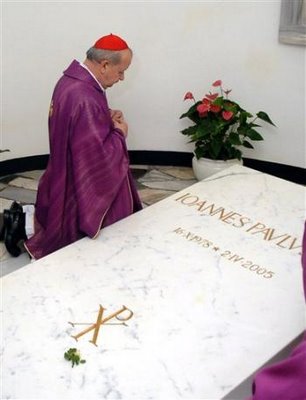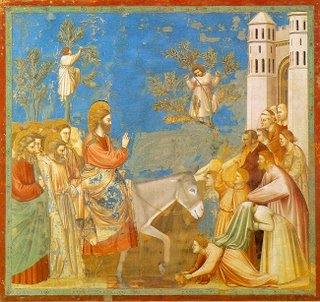Tuesday, April 3, 2007
www.KeepBillyDonovan.Com
Gator fans are finally happy with their coaches...http://keepbillydonovan.com/
Labels:
Dubruiel,
Joseph Dubruiel,
Michael Dubruiel,
Mike Dubruiel
Champions, Yet Again!
Labels:
Dubruiel,
Joseph Dubruiel,
Michael Dubruiel,
Mike Dubruiel
New Auxiliary for Rockville Center
Peter A. Libasci--A Saint Meinrad alumn (as I am...of the college for me).
Labels:
Dubruiel,
Joseph Dubruiel,
Michael Dubruiel,
Mike Dubruiel
Monday, April 2, 2007
In the Communion of Saints...

Pope Benedict's homily for the Anniversary of Pope John Paul II's death:
For a long time, he had been preparing himself for this last encounter with Jesus, as the different drafts of his testament show. During long hours in his private chapel, he spoke to Him, abandoning himself totally to His will, entrusting himself to Mary, repeating Totus tuus. Like His divine Master, He lived his agony in prayer.
On the last day of his life, eve of the Sunday of Divine Mercy, he asked to be read the Gospel of John. Assisted by those around him, he wanted to take part in all the prayers of the day and at the Liturgy of the Hours, to make Adoration, to meditate.
The perfume of the Pope's faith and hope and love filled his house, filled St. Peter's Square, filled the Church and spread throughout the whole world. He died praying. Truly, he went to sleep in the Lord. What happened after his death was - to believers - the effect of that fragrance that had reached everyone, near and far, and drew them towards a man whom God had progressively conformed to Christ.
And so we can apply to him the words of the first verse of the Servant of the Lord that we heard in the first Reading: "Here is my servant whom I uphold, my chosen one with whom I am pleased, upon whom I have put my Spirit; he shall bring forth justice to the nations,..."
And:
Dear brothers and sistes, the Responsorial Psalm has given us words full of faith. In the communion of saints, we seem to hear the voice of of our beloved John Paul II, who from the house of the Father - we can be sure - does not cease to accompany the journey of this Church. "Wait for the Lord with courage; be stouthearted, and wait for the Lord. (Ps 26. 13-14).
Labels:
Dubruiel,
Joseph Dubruiel,
Michael Dubruiel,
Mike Dubruiel
Anniversary of The Great's Departure and Divine Mercy Novena

St. Faustina recounts that Jesus asked not only for a Feast of Divine Mercy, which the Servant of God, Pope John Paul II declared during his pontificate (and ironically died on two years ago on April 2nd--the Feast is movable, this year will be celebrated on April 15th), but also that Our Lord asked that a novena (nine days of prayer) to be prayed by the faithful starting on Good Friday and ending on the Feast of Divine Mercy (the Second Sunday of Easter).
I explain the history of this novena as well as include the prayers for it in The Church's Most Powerful Novenas
The Divine Mercy Novena is a beautiful way to begin the Easter season by reflecting upon the great love that God has for us, expressed by Jesus on the cross. The prayers dictated to St. Faustina by Jesus--express His love for all of us for whom He died and reminds us that none of us, no matter how far we think we have fallen are outside of the reach of His love, forgiveness--His Mercy.
Labels:
Dubruiel,
Joseph Dubruiel,
Michael Dubruiel,
Mike Dubruiel
Flashback to December
Labels:
Dubruiel,
Joseph Dubruiel,
Michael Dubruiel,
Mike Dubruiel
Sunday, April 1, 2007
Palm Sunday and the Pope's Appeal to the World

Pope Benedict appeals to the world to look to Christ:
“If God’s words and the Church’s message leave you indifferent – then look to me, to the God who made himself flesh to suffer for you and with you, - see that I suffer for your love and open yourself to me and God the Father”.
A summary of his homily...
First of all, the procession of the Palms, is “an expression of joy because we can know Christ, because he allows us to be his friends and gifts us the key to life”. The Pope added “Yes, we have seen and still see the wonders of Christ, how He leads men and women to give up the comfort of their own lives and put themselves completely at the service of those who are suffering, how He gives men and women the courage to oppose violence and lies and make room in the world for truth; how He, in secret, leads men and women to do good for others to seek reconciliation where there was hate, to make peace were there was conflict”. The Pope said that the procession is a profession of “Jesus Christ King”, asking for the “grace to follow Him”.
The Pope then explained “what “following Christ” means in concrete terms”. He said “It means changing our interior existence. It requires us not to close in on ourselves considering our own relationship with the exterior world our principal reason for living. It requires that we gift ourselves to Another – for truth, for love, for God who, in Christ precedes us and shows us the way. It means making the fundamental decisions to no longer consider utility and earnings, career and success as the ultimate aim of my life, but rather to recognise as authentic criteria truth and love. It means deciding between a lives spent living for oneself or a life gifted – for a greater cause. It means taken into serious consideration that truth and love are not abstract values; they became flesh in Christ. By losing myself in Him, I find myself”.
Benedict XVI then commented on one of the hymns sung during the procession of the Palms, psalm 24 [23], which speaks of “going up the mountain of the Lord”, as an expression of going up towards God, in an “interior” and “exterior” sense. The Pope highlighted the “two essential conditions” to in becoming a disciple of Christ, and to “go up the mountain of the Lord”. The first is to “search for God, to look for his Face”. He referred himself particularly to the young people “Dear young friends – how important this is in today’s world: don’t let yourselves be simply led without direction in life; don’t content yourselves with what others think or say or do. Look intently around yourselves in your search for God. Don’t allow the call to God to dissolves itself in your souls. Desire that which is the greatest of all. Desire to know Him – his Face”.
“The other concrete condition in rising up to God is this: only those of “innocent hands and pure heart” may stay in the holy place. Innocent hands - are hands that are not used for acts ofviolence they are hands that are not sullied by corruption and bribes. Pure hearts – when is a heart pure? Hearts are pure when they are not stained by lies and hypocrisy. Which remains as clear as spring water because it does not know duality. A heart is pure when it is estranged from the intoxication of pleasure; a heart for which love is true and not just the passion of a moment. Innocent hands and clean heart: if we walk together with Christ, we will rise and find the purifications which truly bring us to that height to which man is destined: friendship with God Himself.
Benedict XVI then recalled another symbol – now no longer in use – of the Palm Sunday procession, when the priest on his arrival at the door “smote the closed door with the processional cross, which then opened before him” . The Pope explained “the image beautifully depicted the mystery of Christ who, with the wood of his cross, the strength of his love gifted to us, knocked from the world on God’s door; a world that was failing to find access to God”.
The Pontiff concluded “with the cross Christ burst open the door to God, the door between God and humankind. Now it is open. But also from the other side our Lord is knocking with his cross: he is knocking on the world’s door, on the door to our hearts, which all too often and often in great numbers remains closed to God”.
Almost in an appeal to all of the world’s “indifferent” – made so by too much science or too much pain – Benedict XVI added that Christ “ speaks to us more or less in this way: if the proof that God gives you of His existence in creation fails to open you to Him; if God’s word and the Church’s message leave you indifferent – then look at me, at the God who made himself flesh to suffer for you, with you – see that I suffer for your love and open yourself to me and God the Father”.
Labels:
Dubruiel,
Joseph Dubruiel,
Michael Dubruiel,
Mike Dubruiel
Subscribe to:
Posts (Atom)

